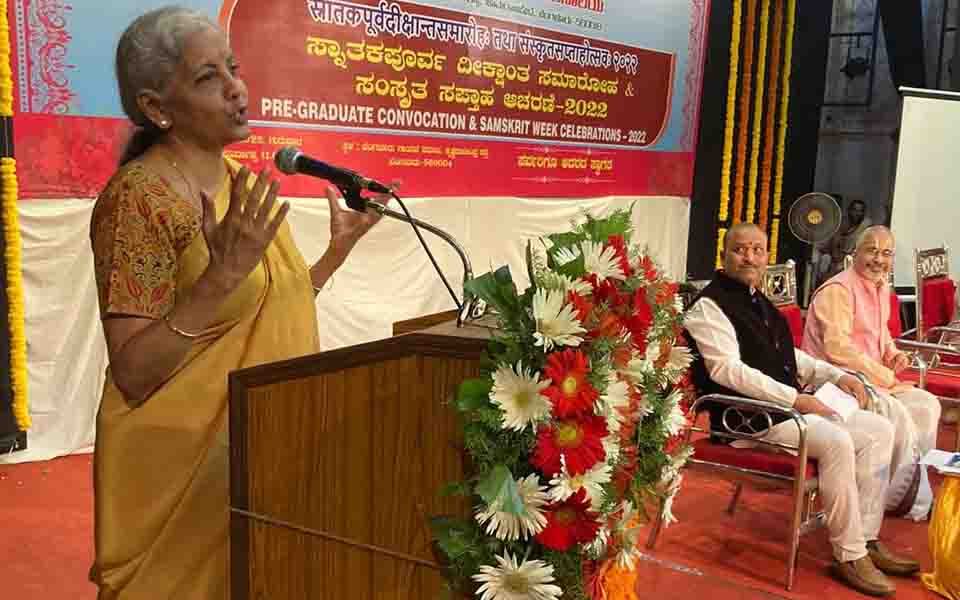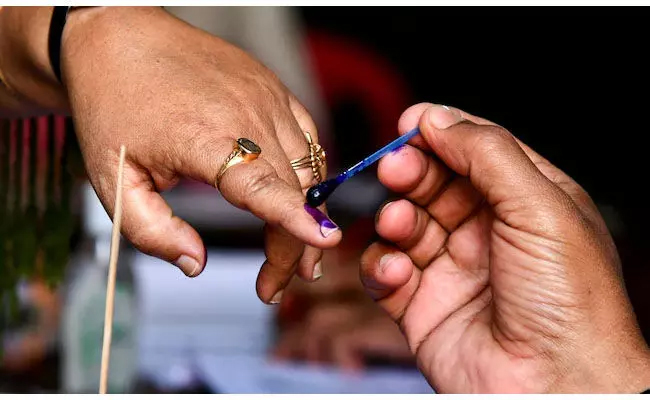Bengaluru, Sept 29: Union Finance Minister Nirmala Sitharaman regretted on Thursday that learning of Sanskrit is discouraged in Tamil Nadu.
She said in her early schooling and going till college, learning Sanskrit was not easy at all because of the "political environment in which we lived."
"And it's not as if I lived in a foreign country. I lived in Tamil Nadu. Sanskrit was discouraged and I think even today they discourage," Sitharaman said.
In spite of that, she said her parents insisted and she found a good teacher and privately learnt Sanskrit "somewhat".
"Learning Sanskrit or learning Hindi was not encouraged at all (in Tamil Nadu)..," the Minister said.
Sitharaman was speaking at a function organised by 'Karnataka Samskrit University', on the occasion of Pre-graduate Convocation and 'Sanskrit week celebration'.
She said she is very proud to know that Karnataka as a State is encouraging learning of Sanskrit.
The Rajya Sabha member from Karnataka said she was very impressed to know that more than 35,000 students all over Karnataka are learning Sanskrit.
Sitharaman said in the last seven-eight years, since Narendra Modi became Prime Minister, several steps have been taken to develop, encourage and cultivate India's rich and ancient language, including financial assistance to research projects and publications.
Let the Truth be known. If you read VB and like VB, please be a VB Supporter and Help us deliver the Truth to one and all.
Hyderabad (PTI): Asserting that war and warfare is at the cusp of a major revolution, Chief of Defence Staff (CDS) General Anil Chauhan on Saturday said the Indian Defence forces are committed to adapting to changing environment and imbibing reforms to remain ready and relevant.
Addressing the Combined Graduation Parade (CGP) of 216 Course held at the Air Force Academy at Dundigal near here, General Chauhan said India's strength rests on robust institutions, democratic stability, and unwavering professionalism of our Armed Forces.
He said the intensity of operations may have ebbed, but Operation Sindoor continues.
"You (new officers) also join the Air Force at a moment when a new normal has firmly taken shape. An era defined by a high degree of operational preparedness, 24-7, 365 days. The intensity of operations may have ebbed, but Operation Sindhur continues," he said.
He further said the newly trained officers are entering the Indian Air Force during a phase of deep transformation of the Indian Armed Forces.
Integrated structures, joint operations, and national pursuit of Atmanirbhar Bharat in defence are shaping the future of India's military strength, he said.
"Your journey ahead will be accordingly guided by Jai, the first word of Jai Hind, that's victory. 'J' stands for jointness, fighting as one nation, one force. 'A' stands for Atmanirbhar Bharat, trusted platforms and systems made not just for India but for the world. And finally, 'I' for innovation, daring to think ahead and to be ahead of the curve," he explained.
General Chauhan further said battles in the older domains will always remain contested, often brutal. But in the new domains, they will be smart, swift, and shaped by intellect, innovation, and initiative. The force that masters new frontiers is more likely to prevail in future conflicts.




